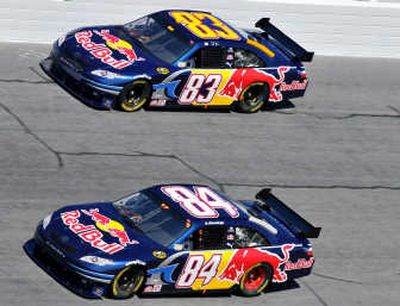In the Pits: Red Bull charges

CHARLOTTE, N.C. – Brian Vickers and AJ Allmendinger both failed to make it to Victory Lane at Pocono Raceway. Still, there was an air of celebration around Red Bull Racing when the drivers completed the exhausting 500 miles of racing.
Vickers had finished second, and Allmendinger a career-best 12th for Red Bull’s most complete day of racing since its turbulent entry into NASCAR.
After a horrendous inaugural season of struggles that saw both drivers combine to miss 32 starts, Sunday’s showing proved the team is making slow but steady steps toward becoming a competitive player in NASCAR. The strong day capped a solid five-week run during which the Vickers team won the Pit Crew competition and Allmendinger scored his first stock-car victory by winning the non-points qualifying event before the All-Star race.
Then, developmental driver Scott Speed, shipped over to NASCAR after a disappointing Formula One run, added a Truck Series victory two weeks ago in Dover to the ARCA win he’d picked up weeks before.
“We’re kind of starting to get on a roll,” said general manager Jay Frye. “We had a good day (in Pocono). Last week we had a pretty good week. But you’ve got to finish the deal, too, and finishing the deal is actually winning the race. We came closer to finishing the deal (at Pocono) than we ever have.
“We’ve got a long way to go, but we’re pointed in the right direction.”
That’s really all anyone can ask, after Red Bull’s electric entrance fell flat.
With unlimited financial resources, a partnership with Toyota and a reputation for throwing the best parties on the F1 circuit, Red Bull was supposed to take NASCAR by storm. But when the deep pockets failed to lure a superstar driver, the team instead decided to groom its own talent.
Vickers, the low man on the Hendrick Motorsports totem pole, was tabbed to be the star of the program and immediately race for wins. Allmendinger, fresh off a headline-grabbing run of wins in the underwhelming Champ Car Series, would adapt to stock cars faster than Juan Pablo Montoya and be the first successful open-wheel defector.
Only one problem: The startup team didn’t have the infrastructure to support its grand plans, and quickly appeared to be nothing more than an organization with more style than substance.
It didn’t help that the team was determined to run itself like an F1 organization. It was a European mind-set – maybe even arrogance – that prevented Red Bull from understanding the nuances of NASCAR.
When the checkered flag finally waved on the dismal first season, the relationship with Toyota was strained and Red Bull had wasted millions of dollars in looking cool while failing miserably.
But some time before preseason testing, the leaders back in Austria finally realized the original course of action was an unmitigated disaster. They smartly hired Frye, who had worked wonders for close to a decade making underfunded race teams competitive as they stretched themselves down to their last dollars.
On the sideline since Dale Earnhardt Inc. swallowed cash-strapped Ginn Racing last summer, Frye had the NASCAR knowledge Red Bull so desperately needed.
He immediately reorganized, then repaired the relationship with Toyota.
A former college football player, Frye used inspirational speeches and a clip from “Any Given Sunday” to rebuild confidence that had wavered during the embarrassing first season.
The impact was immediate for Vickers and the No. 83 team, which blazed out of the gates and had cracked the all-important top-35 mark by the fifth race of the season. With Vickers no longer in danger of missing races, Frye turned his attention to the still-slumping No. 84 team and made the difficult decision to pull Allmendinger from the car.
Allmendinger was not ready for a Cup ride when Red Bull handed him the keys to his Camry, and in missing 19 races last season, he never got the seat time required to learn on the job. So when he missed the first three races of this season, Frye had to stop the bleeding – and the first step was assessing what was wrong with the team.
Mike Skinner stepped into the seat, giving Red Bull a veteran who could help the team decide if its problems were driver or crew related. While doing so, Allmendinger was able to watch from the sideline and get a better grasp of the communication and feedback a driver needs to provide so the team can give him a competitive car.
Allmendinger hasn’t missed a race since he returned to the car, and his team heads into Michigan this weekend ranked 37th in the points.